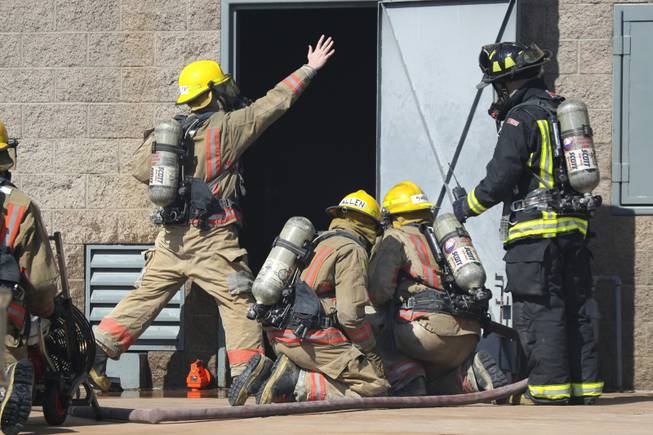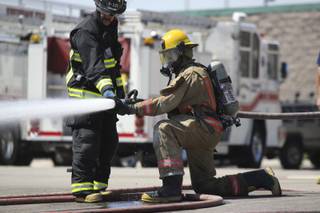
Mona Shield Payne / Special to the Sun
Trainee Justin Clift, center, checks the radiating temperatures before entering a burning structure with this team, from left, Mike Allen, Daniel Schuster and instructor Jerry Kelso, during a training exercise with the Boulder City Fire Department Aug. 15 at the Henderson Fire Department Training Center.
Monday, Aug. 24, 2009 | 1:59 a.m.
Sun coverage
The night of the annual police-firefighter softball game Aug. 4, Boulder City Fire Department coach Walt West wasn’t sure he would have nine players on the field. He recruited a couple of extras from the Henderson Fire Department Explorers program just to be sure. When no position went unfilled, it was a relief.
The reason: In the past year and a half, the Boulder City force has lost about one-third of its 42-member career and reserve firefighters to other squads, Fire Chief Kevin Nicholson said.
It’s a measure of the small department’s success that its members are so attractive to other departments within the Las Vegas Valley and elsewhere, the chief said.
Due to the evolving nature of the profession, the Boulder City department recently increased its requirements. As a result, Boulder City-trained firefighters are well-positioned to compete in a process in Las Vegas or Clark County that typically selects four of every 100 candidates.
“Everybody likes them, because Boulder City generally has pretty high standards for the reserve program,” said Bruce Evans, an assistant fire chief for North Las Vegas and director of the College of Southern Nevada’s fire science program. “Commonly their folks get picked up into larger metropolitan departments.”
This year, Nicholson said, he has lost five career and 10 reserve firefighters to other departments. Five of them graduated just this week from the Henderson fire academy.
Ironically, the Boulder City fire reserve program has higher entry standards than the metropolitan fire departments it feeds. Would-be firefighters must already have their certification as emergency medical technicians at both the basic and intermediate level as well as certification as a Level 1 firefighter — requirements that take about two years and several thousand dollars worth of education.
Beginning firefighters in valley squads make $50,000 to $60,000,
The Clark County and Henderson fire departments and Las Vegas Fire & Rescue require only EMT-Basic certification, which takes one semester.
Once Boulder City applicants meet the requirements, they qualify for part-time positions working alongside full-time firefighters at the town’s sole fire station. Those who continue their education to become paramedics have a good chance at joining the career force, Nicholson said.
That is necessary in a small department like Boulder City, where everyone has to do every type of job and the veterans don’t have much time to train rookies, Nicholson said.
“We’ve stepped away from the concept of taking someone from the streets,” he said. “It takes 19 to 20 weeks to get them trained, and then they leave in two to three months for another department.”
Instead, the Boulder City Fire Department accepts applications for its reserve program, then puts those who meet the educational standards through eight weeks of testing to ensure they can put that education to use.
In the recent batch of new reservists, Nicholson began with 25 applicants. Five completed the process.
Reservists make up the list of people Nicholson chooses from when he has a full-time opening, but they have to obtain their paramedic certification before they can even be considered.
Those higher standards make his employees more competitive in the selection process of larger departments, Nicholson said.
“They come to them with knowledge and skill as compared to someone who has none,” he said. “That’s why we’re losing our people all the time.”
The change in requirements reflects an progression in the fire service from a predominantly blue-collar job where a physically fit high school graduate could excel to one that requires a couple of years of college to get into the door.
“Our candidate pools are generally more educated today than they were back then,” Henderson Deputy Fire Chief Steve Goble said. “That’s the evolution of the fire service.”
A big factor driving that need for education is the shift in calls from fires to medical services. In 2008, 72 percent of the calls for the Clark County Fire Department were medical, spokesman Scott Allison said. That reflects the trend at most departments, Evans said.
Beyond that, firefighting is becoming a more technical line of work, with knowledge of hazardous materials, high-rise technology and building construction needed to do the job well, Evans said.
New Boulder City firefighters understand the need for education and continue to juggle classroom time with long hours at the station.
Reservist Terry Stevens didn’t give college much thought after he graduated from Boulder City High School, but he found himself back in the classroom once he decided to pursue firefighting.
“I never planned on college,” he said. “I ended up going for two years. I had to get my Firefighter 1 certification.
“Now I have to go back to paramedic school.”
Beau McDougall, who recently joined the career force, began his studies at UNLV in sports medicine before switching to CSN for fire services and paramedic training. He plans to head back to UNLV to get his bachelor’s and master’s degrees with the goal of becoming a fire chief someday.
“You have to better yourself, to make yourself attractive to the department,” he said.


Join the Discussion:
Check this out for a full explanation of our conversion to the LiveFyre commenting system and instructions on how to sign up for an account.
Full comments policy